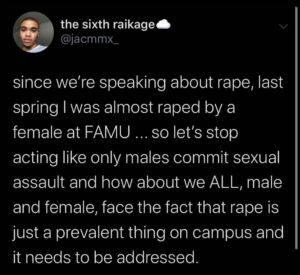
Earlier this year, students from Florida A&M University took to Twitter to express their frustrations about a trend they believe was spreading throughout the campus, one they referred to as a “rape culture.” Hundreds of students slammed the university for not doing enough to protect its students and assist those who reported sexual assault allegations.
Jireh Murray, who is currently studying at the university, said that he was almost raped by a female student, but believed no one cared about it because he’s a male.
“Last spring I was almost raped by a female at FAMU,” he said. “Let’s stop acting like only males commit sexual assault and how about we all, male and female, face the fact that rape is a prevalent thing on campus that needs to be addressed.”
Another student, Minyon Jenkins, a junior majoring in Interdisciplinary studies with a focus in Korean and creative writing, accused another student via Twitter of trying to rape her, but felt that due to the student’s fraternity association, he wasn’t investigated thoroughly.
“(He) was a member of the Alpha Xi chapter of Kappa Alpha Psi fraternity, and he tried to pin me down and choke me in an assault after I repeatedly told him I didn’t want to continue,” she said. “He is dangerous and another woman expressed similar concerns about him as well.”
Since Jenkins decided to make her accusations public on social media, it prompted hundreds of other students to share their frustrations with the university, which they believe has not addressed the rape and what FAMU is doing to protect its students.
In March, the Tallahassee Democrat posted an article about FAMU’s negligence to investigate another student’s rape allegations. According to the Democrat, “The lawsuit alleges that FAMU was negligent in not pursuing full investigations involving the allegations, thereby violating Title IX guidelines that protect against discrimination on the basis of sex in the provision of educational opportunities and administration of student discipline.”
The student who has been identified as S.B was furious that the school wanted to release her name as a victim, an act that she felt would put her in more danger.
Linney Osias, who says she was sexually assaulted off campus, felt that the university didn’t do enough to protect her while she was on campus, due to her alleged attacker being a FAMU student.
“The school put a restraining order on everyone that was involved in the situation and took no further actions. It’s a step, but it did not make me feel any safer to be on campus,” she said.
“I faced seeing the person who’s home I went to and being told by his brothers to be silent about the situation,” Osias added. “I had to also begin counseling because I was severely depressed after continuously having to tell my story. The case with TPD went on for a year, and the final verdict was not guilty. I do not feel that my university as a whole has my best interest at heart when it comes to protecting me and the women of my student body.”
While the students have yet to receive a public to response to the issue they hope for, FAMU has made visible efforts throughout the campus to solve the problem.
According to the FAMU Police Department, they have done everything in their power to keep students safe while they are on campus. A representative for the department who identified herself as “Hodge,” says the university has implemented a blue light system which can provide students with immediate assistance from campus police.
“The purpose of the blue lights are for students to press the buttons when they feel like they are in danger,” she said. “After they press the button, an alert will be sent to FAMU’s PD headquarters, which will alert us of their location and an officer will be sent on the scene.”
So far the system has been a success and some students seem to be pleased with the efforts from the university. Krystle Green, a graphics student, recalled using the system after a long night of studying at the library.
“I was leaving Coleman after studying and as I was walking to my car, I just felt like someone was following me,” said Green. “As I listened closely to the footsteps I could hear them speeding up. While I wasn’t sure if I was in danger, as a woman and a mother of three I couldn’t take any chances and hit the blue light,” she said. “After hitting the blue light the person ended up turning around. Although I didn’t wait for the police to arrive, I couldn’t imagine what would’ve happened had that light not been there.”

A relatively new student organization, Warriors Against Rape, has made efforts to help solve the problem. The group, which was founded for FAMU students and the Tallahassee community by Alyssia Mikes, provides a safe platform for students to speak about their issues and assist them with reporting, counseling, and educational workshops on how to deal with several issues.
“I founded it due to all the experiences and outcry I heard on campus regarding the sexual violence problem,” said Mikes. “We do community service and educational events as well as partner with organizations on campus to do workshops, classes, and informational sessions regarding resources for survivors, consent, and ways to cope, to name a few.”
To get involved contact W.A.R. through Instagram @w.a.r.1887